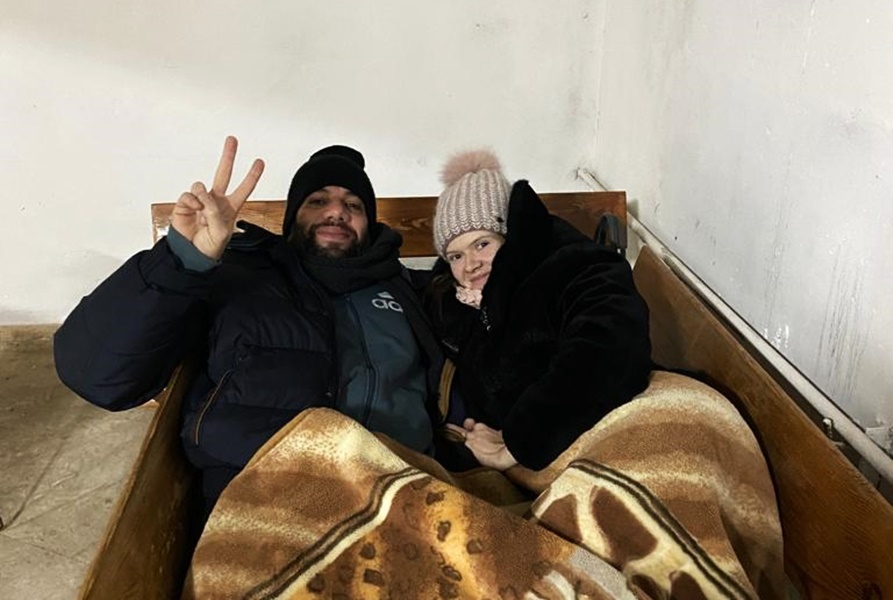From the very beginning of Russian aggression against Ukraine, the Russian army has been destroying Ukrainian cities and villages. Russian aviation and artillery purposefully destroy residential areas and civilian infrastructure. The civilian population is dying. Servicemen of the Russian army are killing Ukrainian citizens, robbing their property, destroying their homes.
Starting the war, the Kremlin counted on a quick victory. Putin and his generals did not expect to meet resistance. They planned to capture Kyiv in two or three days, change power there and hold a “victory parade”.
The Ukrainian army and society broke these plans.
The army and citizens of Ukraine are bravely fighting against the eastern barbarians. Now it is clear that Ukraine will win this war. The complete defeat and destruction of the Russian army is only a matter of time.
Unable to cope with the Ukrainian army and the fighters of the territorial defence, the Russian troops switched to their usual tactics of warfare. They are shelling cities and destroying the civilian population, trying to blackmail the Ukrainian authorities and the world community in order to force Ukraine to capitulate.
Evil Empire — Russia is committing terrible war crimes. Crimes against humanity.
Before the start of the war, many citizens of other countries lived in Ukrainian cities, especially in the large ones. Mostly students and businessmen. Among them there were citizens of Cyprus.
One of our fellow citizens lived in Kharkiv. He witnessed the beginning of the war and everything that happened in the city during the eight days of the war. He and his wife, a citizen of Ukraine, miraculously left Kharkiv, besieged by the Russian troops. They fled to Hungary and from there went to Cyprus.
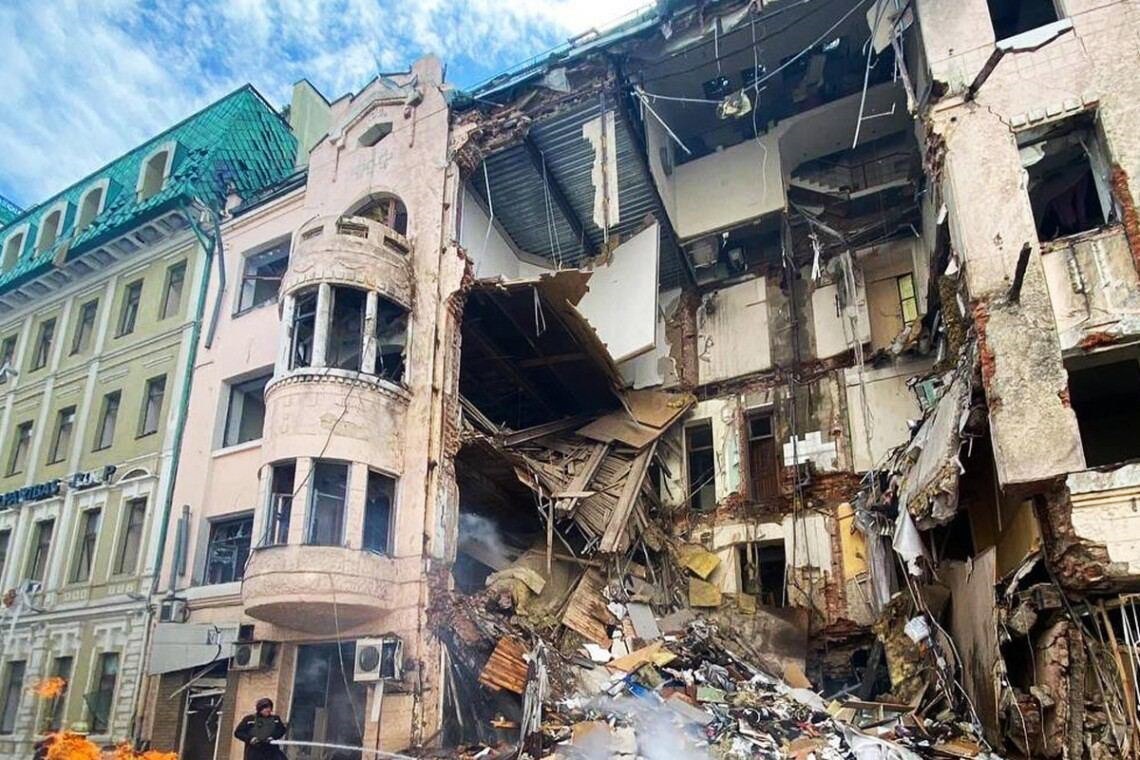
The Cyprus Daily News correspondent spoke to Christos and Inna. This is their story.
— Christ, how did you end up in Kharkiv?
— A few years ago, in social networks, I met my future wife and came to visit her in Kharkiv. We got married. In January of this year, I had time off from work. I am a sailor by profession. As severe coronavirus restrictions were introduced in Cyprus, my wife and I decided to go to Kharkiv and live there for a while. In Ukraine, there were no such severe restrictions.
We lived in the University campus where my wife was working.
— What can you say about Kharkiv and people there?
— I really liked living in Kharkiv. It was a modern European city, very clean and comfortable for life with an excellent infrastructure.
Kharkiv citizens are open and friendly people. It was a wonderful city. Now the city is completely destroyed.
— Before the start of the war, did you know that Russia could attack Ukraine?
— I read about it in the world media. I also watched Greek and Cypriot television, where they also talked about this. But no one believed in it. Everyone said that this was a bluff and that Putin was only scaring the Ukrainian government to comply with his demands.
I talked to the residents of Kharkiv and no one believed it, especially the older generation. They said that the Russians could not fight the Ukrainians because they were brother nations.
In addition, I saw Putin’s speech on TV, where he said that he was not going to attack Ukraine. I didn’t think that he, as a president, could tell such a lie!
— Do you remember how the war started?
— At 4:30 am on February 24, we were awakened by explosions. At first, the explosions took place far from the city, but every hour they were getting closer. The next day the Russians began bombing the city.
We immediately went down to the basement of our house in order to somehow hide from the bombing. The basement was locked and I had to break it down. The basement was very small, not suitable for bomb protection. Many people were there, it was very crowded. It was impossible even to sit down there.
We were there one day without food or water. We were afraid to go up to the apartment, because the Russians were bombing the city continuously, and explosions were often heard very close to our house.
The next day we were informed that there was a bomb shelter five hundred meters away from us, it was safer and there was more space. We ran there and took refuge in this bomb shelter. We felt more secure there.
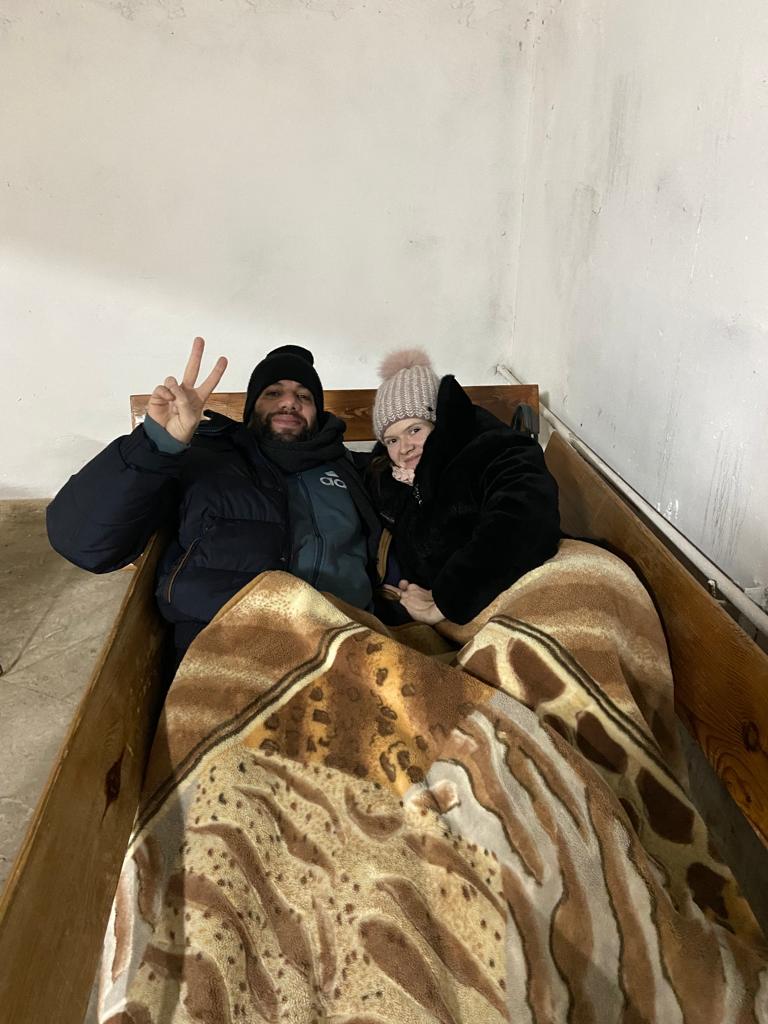
— Did you have food, water, medicine?
— At first we had nothing. On the third day at six in the morning we ran to our house and took everything we could — food, water, clothes, a blanket, pillows.
— Why didn’t you just leave the city?
— Unfortunately, I do not speak either Ukrainian or Russian and did not understand exactly what was happening and how to act in this situation. My wife was very frightened and did not want to believe that the war had begun.
Many people with whom I spoke through my wife said that this was some kind of a mistake, a war could not have broken out. Many people assured us that it would not last long and that it would all be over soon.
I listened to Greek and Cypriot news. They announced the start of negotiations between Russia and Ukraine and the ceasefire. I was waiting for everything to end soon. I could not imagine that someone could bomb a peaceful city and kill people. It didn’t fit into my head.
— When did you decide to leave the city?
— When the war started, I wanted to leave immediately. But I made a mistake — I contacted the Cypriot embassy at 00 380 (97) 504 95 58, said that I was in Kharkiv, asked what I needed to do and asked for help. I was told not to move and wait for instructions from the embassy. According to them, they were preparing an evacuation plan and would inform me soon when it would begin. They demanded that I stayed in Kharkiv and put pressure on me.
I called every day and each time they told me not to go anywhere. I was convinced that an evacuation was being prepared, lists of people were being prepared and a bus would come for us. I heard it every day. Every day they told me the same thing and did nothing! And the situation in the city got worse and worse every day.
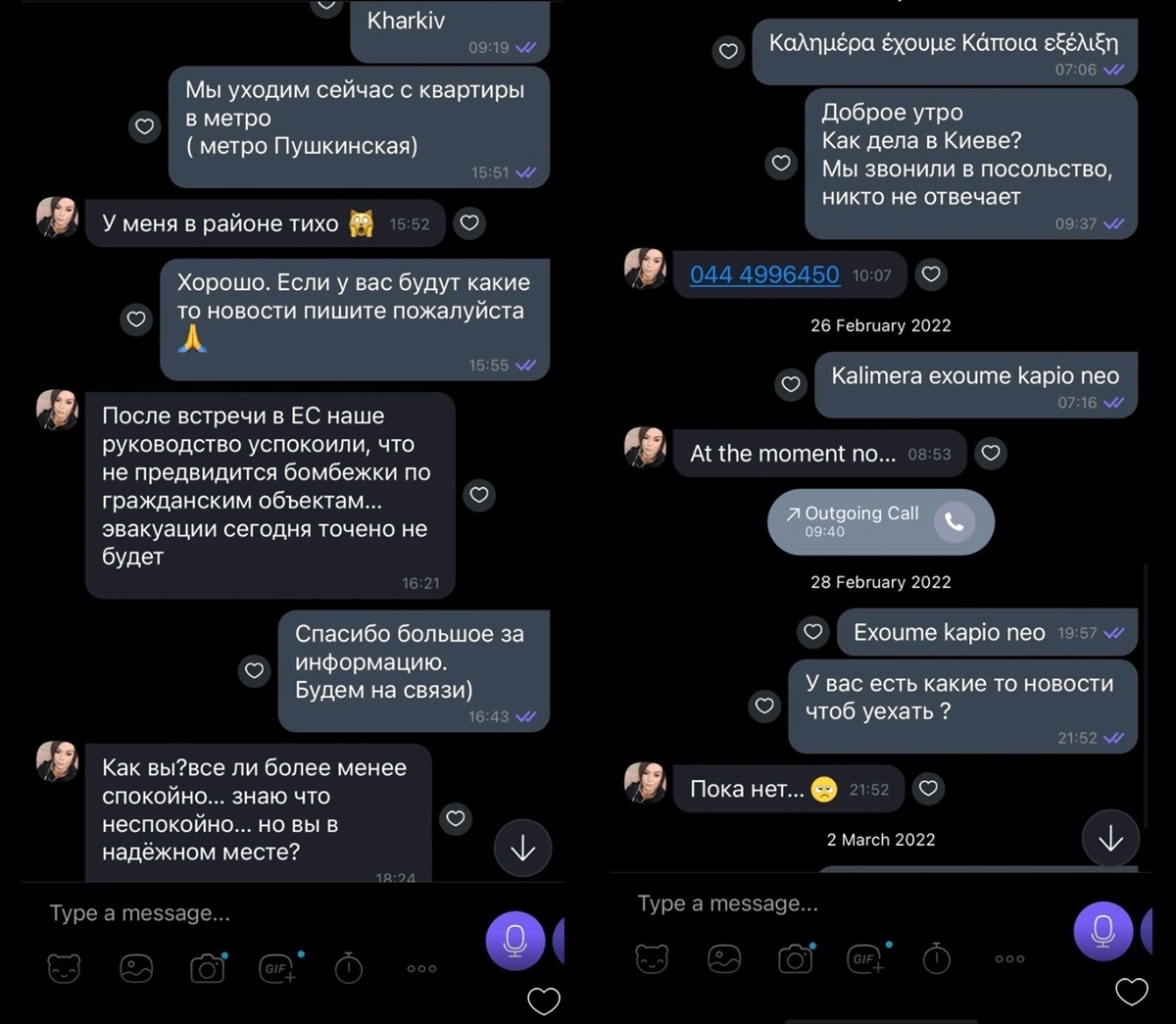
I also called the Greek Embassy at: 00380444996450, 00380444996451, 00380975049558.
But even there they told me not to leave the bomb shelter and wait for them to organize an evacuation. For a week I called and wrote to both embassies and all the time I was told to wait. I was sent messages in different languages that I should wait for instructions and not leave the shelter.
I trusted them and followed their instructions. But they didn’t work. They just didn’t do anything…
My family turned to the Ministry of Foreign Affairs of Cyprus with a request for help. They were told that they were preparing a plan to save me. I got a call from the Ministry of Foreign Affairs of Cyprus and asked if I was still alive. I said that though we were alive, we did not have water and food. Bombs were falling all around us and we wanted to get out as quickly as possible. They told me that they were preparing a special plan for my rescue.
But nobody did anything.
At the same time, the leader of the Ukrainian community of Cyprus, Tatyana Ioannou, was in Kharkiv. One of the Cypriot TV channels contacted her and interviewed her. My relatives saw this interview, contacted the TV channel and got her contacts.
My sister called Tatyana and said that I was also in Kharkiv. She called me back, but, unfortunately, we could not help each other in any way. We were all in the same situation.
Then journalists from this TV channel called me and offered to give them an interview. They didn’t offer any help, so I refused.
The situation in Kharkiv worsened every day. Bombing and shelling intensified, and the intervals between them decreased. If in the first days they bombed and fired at the northern and eastern outskirts of the city, then on the third day bombs and rockets began to fall throughout the city. There were no safe places in the city at all. At any moment, in any place, bombs and rockets could fall. Destruction and fires were in all parts of the city. The Russians were systematically and methodically destroying Kharkiv.
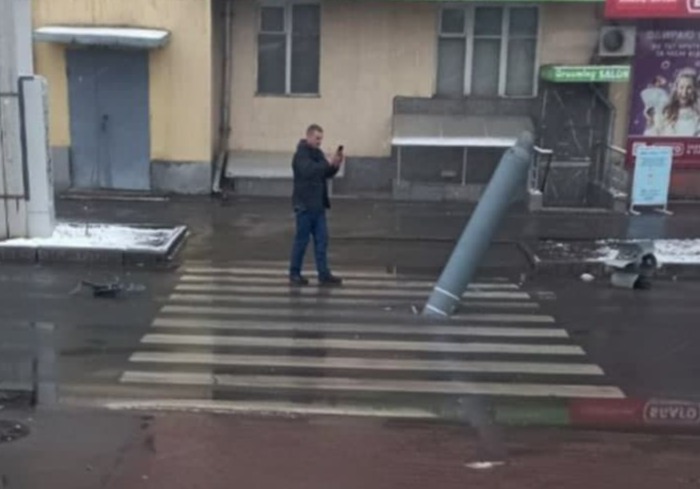
On the third day we heard gunfire from the street. It was scary to leave the bomb shelter. Due to the constant explosions and shooting, many people in the bomb shelter began to panic. We hadn’t slept for a week. We were very tired emotionally and physically.
On the fifth day, after another conversation with the embassy, I realised that no one was going to help me and I decided that I needed to get out of this hell on my own.
On the sixth day, the phone at the Cypriot embassy was no longer answering …
I went outside and started looking for someone who could take my wife and me out of the city. But no one could help us.
On the street, I met two people who said that there were buses near the university, ready to evacuate foreign students. I ran there and saw the bus of the Turkish embassy there, which was picking up Turkish students. I didn’t go there to ask…
The shelling of the city began again, and I returned to the bomb shelter. At night, I finally decided to flee the city and began to think about options. I remember that night the bombing of Kharkiv was especially strong.
— How did you leave Kharkiv?
— On the morning of March 2, my wife said that one of the women in the bomb shelter was going to the railway station and was waiting for a car that would take her there. I asked this woman to take us with her. She agreed. We did not have a clear plan, we only decided to make our way to the west and cross the border with the European Union.
We arrived at the Kharkiv railway station and saw a huge number of people. There was chaos all around. People did not know when the trains were coming and in which direction they were going. It was impossible to get information about the movement of trains. Crowds of frightened and desperate people stood on the platforms, trying to escape from this hell. There were many foreign students among them.
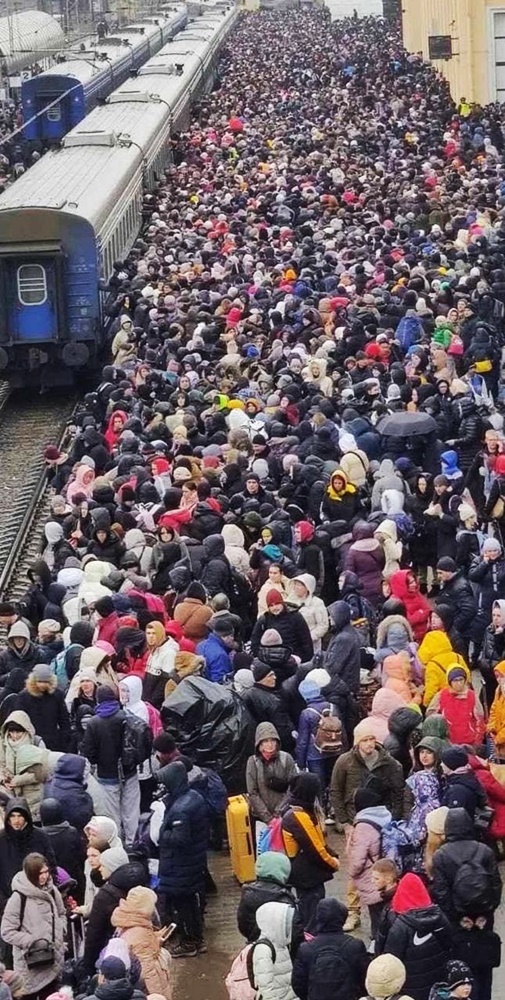
We decided to take any train we could get on. There was no need to buy tickets for this, everything was free.
When the train approached, crowds of people rushed towards it, and a stampede began. The military guarding the station announced that only women, children and the elderly would be allowed on the train. The men were not allowed to board the train.
I suggested to my wife that she should leave without me, but she refused and said that she would stay with me. But even if she had agreed, it would still have been impossible to get on this train, since there were so many people. There were many old people.
Despite the fear and chaos, many people were helping each other and the elderly. In an extreme situation, most people showed their best qualities. But I also saw the opposite cases, when people in this situation behaved in an ugly way. People from Arab and African countries behaved especially uglily. When the train approached and people rushed to the cars, they began to push away children and old people, climbed over people’s heads, beat women and pushed people out. The soldiers guarding the station had to intervene and push them away.
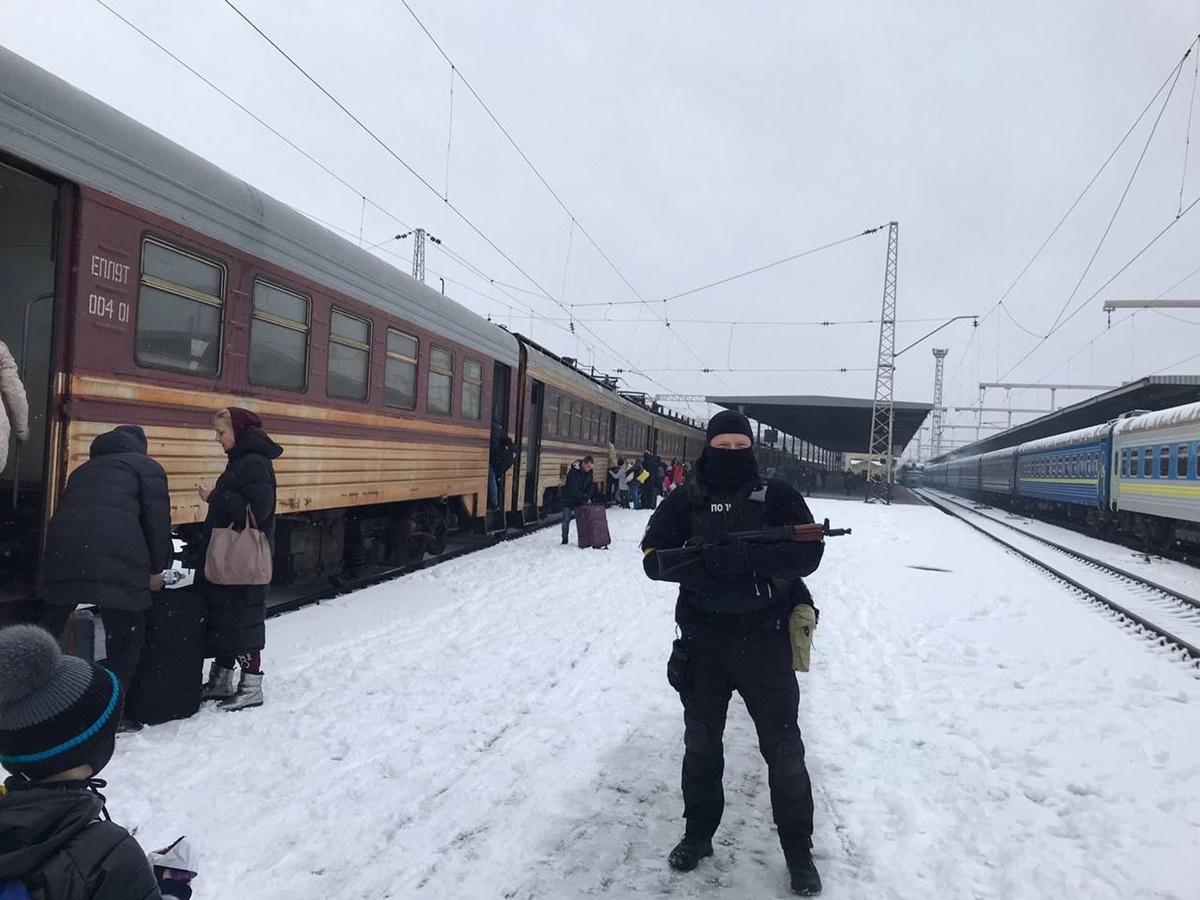
A few hours later another train came and everything happened again.
In the evening it was announced that the last train to Lviv would arrive around midnight and pick up all the foreign students.
When this train arrived, half of the carriages were given for the evacuation of women and children, and the other half for foreign citizens. My wife was able to board the train. I tried to get into the car for foreigners, but it was impossible.
Literally at the last minute before the train left, I went up to the military man and showed him my passport. I said that I was a foreigner, that my wife was already on the train and asked to let me through. He allowed it. I got into the train with my wife at the last second before the train left.
The train was fully packed. We had been riding for twenty hours standing, it was impossible to sit down. At this time, I received a call from the Ministry of Foreign Affairs of Cyprus and was told that my family had informed them that I had left Kharkiv. They asked me what I was going to do and where I was going. I did not tell them anything, because I didn’t trust them anymore.
During the entire journey, the train stopped only once in Kyiv for three hours. Many people on the train had neither food nor water. We had some food and water with us and shared them with others.
Finally we arrived in Lviv. There was a huge number of refugees from all over Ukraine at the station and around it. It was painful to look at them. Many were injured or were in a state of shock. Volunteers worked throughout the station and around it. They fed people, provided medical care, handed out clothes and shoes to those who needed it: delivered food for babies, handed out baby diapers and toys.
Trains kept coming up to the station and taking people to hotels and refugee camps.
I want to say that Ukrainians are amazing people! During this difficult time, they became one big family.
On the advice of friends in Cyprus, we took a train to the city of Chop, on the border with Hungary to move to the Hungarian territory.
We arrived at Chop at three o’clock in the morning. We stopped at the hotel. But at six in the morning we already went to the station and bought train tickets to the Hungarian city of Zahony. An hour later we boarded the train and an hour later we were in Hungary, in the European Union.
Only when we came to Hungary, we started feeling that we were safe and realised that we were very lucky.
In Zohan, Red Cross volunteers worked at the station, they fed the refugees, distributed medicine and free tickets to Budapest.
We immediately got on the train and went to Budapest. There were many refugees from Ukraine with us. I noticed that many of them looked happy despite the fact that most of them had nothing but their clothes. Many didn’t even have phones. My wife and I gave our phones to people so that they could contact their families.
Despite this, people were happy that they were safe. Now I know what real refugees look like! Those who sailed to Cyprus from Turkey to the occupied part of Cyprus and came over to our side, in my opinion, are not refugees.
We came to the hotel in Budapest. There we were finally able to have a shower and rest. The next day we tried to buy tickets to Cyprus, but all the tickets were sold out two weeks in advance. We found tickets via London and drove to the airport.
At the airport, just before boarding the plane, Wizzair representatives demanded that my wife present a British visa, which she did not have, and she was not allowed on the plane.
We returned to the hotel and bought tickets for the next day from Vienna to Larnaca via Athens. Early in the morning we took a train to Vienna and from there flew to Cyprus.
— What do you plan to do next?
— We haven’t even thought about it yet. Now we are just recovering after everything we have experienced and we are happy that we are alive and safe.
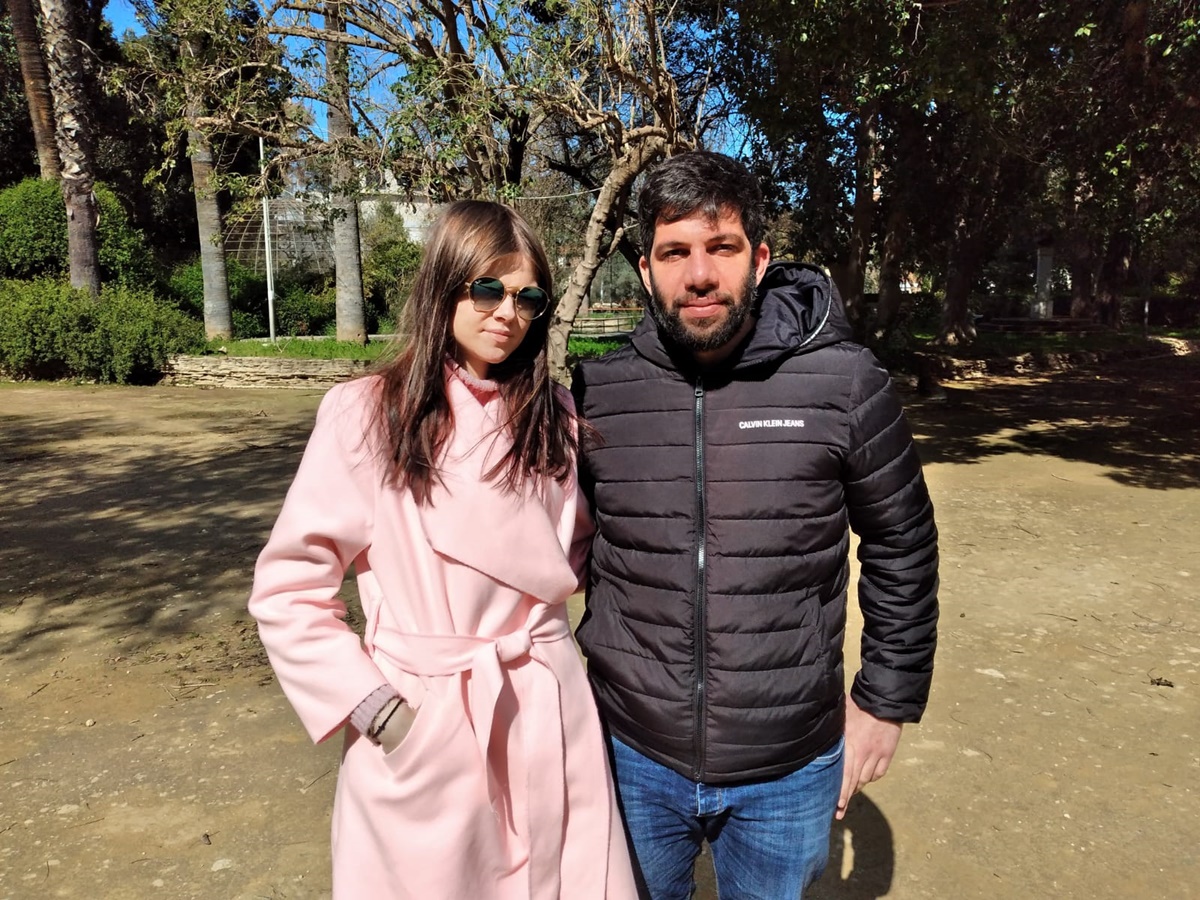
Boris DEMASH
Нас можно поддержать через Revolut
номер +35799820609
или PayPal
Спасибо за вашу поддержку!

